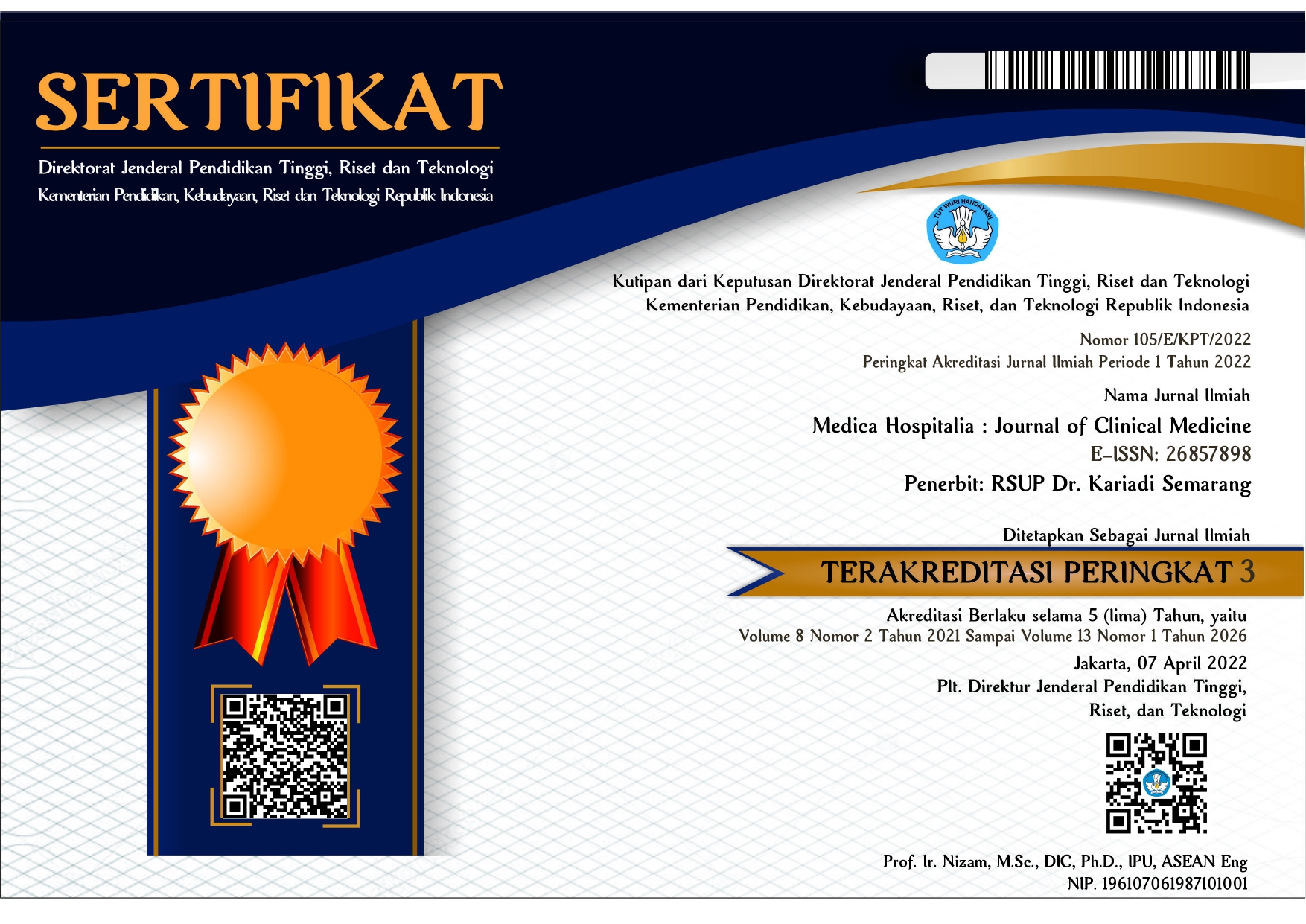Apolipoprotein E Polymorphism and Carotid Intima Medial Thickness Progression in Post Ischemic Stroke Patient
Apolipoprotein E Polymorphism and Carotid Intima Medial Thickness Progression in Post Ischemic Stroke Patient
DOI:
https://doi.org/10.36408/mhjcm.v9i2.750Keywords:
APOE, atherosclerosis, CIMT, post ischemic strokeAbstract
Background : Apolipoprotein E (APOE) gene is believed to associate with cholesterol level, a risk factor of ischemic stroke. CIMT (carotid intima-media thickness) can be used to determine the degree of atherosclerosis. Increased CIMT may predict ischemic stroke recurrence. This study aimed to determine association between increased CIMT in post ischemic stroke patients and APOE genotype.
Methods : This was an epidemiological prospective study involving 71 post ischemic stroke patients (1 month from onset), admitted from 2012 to 2013. CIMT was examined with carotid duplex ultrasound at 1st, 6th, and 12nd month after stroke onset. APOE gene polymorphism was examined using HRM (high-resolution melting) which is a simple method, accurate, and sensitive for genotyping.
Results : We found 5 APOE gene variation categories, i.e. E2E3, E2E4, E3E3, E3E4, and E4E4. The most common allele was E3 and genotype groups E3E3 was the majority of the population. E2E4 allele had the highest CIMT level among others, in the 1st month, 6th month, and 12nd month after stroke, with no association with hypertension, diabetes, and hypercholesterolemia. E3E3 allele was most often associated with hypertension, diabetes mellitus, dyslipidemia, and hyperhomocysteinemia.
Conclusion : The results showed that APOE genotype E2E4 may independently constitute risk factor for atherosclerosis progression (CIMT) in post ischemic stroke patients. While the E3E3 genotype was often associated with hypertension, diabetes mellitus, dyslipidemia, and hyperhomocysteinemia. Our results suggest that APOE E4 was not an important risk factor for carotid atherosclerosis in post ischemic stroke patient.
Downloads
References
Background : Apolipoprotein E (APOE) gene is believed to associate with cholesterol level, a risk factor of ischemic stroke. CIMT (carotid intima-media thickness) can be used to determine the degree of atherosclerosis. Increased CIMT may predict ischemic stroke recurrence. This study aimed to determine association between increased CIMT in post ischemic stroke patients and APOE genotype.
Methods : This was an epidemiological prospective study involving 71 post ischemic stroke patients (1 month from onset), admitted from 2012 to 2013. CIMT was examined with carotid duplex ultrasound at 1st, 6th, and 12nd month after stroke onset. APOE gene polymorphism was examined using HRM (high-resolution melting) which is a simple method, accurate, and sensitive for genotyping.
Results : We found 5 APOE gene variation categories, i.e. E2E3, E2E4, E3E3, E3E4, and E4E4. The most common allele was E3 and genotype groups E3E3 was the majority of the population. E2E4 allele had the highest CIMT level among others, in the 1st month, 6th month, and 12nd month after stroke, with no association with hypertension, diabetes, and hypercholesterolemia. E3E3 allele was most often associated with hypertension, diabetes mellitus, dyslipidemia, and hyperhomocysteinemia.
Conclusion : The results showed that APOE genotype E2E4 may independently constitute risk factor for atherosclerosis progression (CIMT) in post ischemic stroke patients. While the E3E3 genotype was often associated with hypertension, diabetes mellitus, dyslipidemia, and hyperhomocysteinemia. Our results suggest that APOE E4 was not an important risk factor for carotid atherosclerosis in post ischemic stroke patient.
Additional Files
Published
How to Cite
Issue
Section
Citation Check
License
Copyright (c) 2022 Aditya Kurnianto, Retnaningsih, Dodik Tugasworo, Yovita Andhitara, Rahmi Ardhini, Jethro Budiman

This work is licensed under a Creative Commons Attribution-ShareAlike 4.0 International License.
Copyrights Notice
Copyrights:
Researchers publishing manuscrips at Medica Hospitalis: Journal of Clinical Medicine agree with regulations as follow:
Copyrights of each article belong to researchers, and it is likewise the patent rights
Researchers admit that Medica Hospitalia: Journal of Clinical Medicine has the right of first publication
Researchers may submit manuscripts separately, manage non exclusive distribution of published manuscripts into other versions (such as: being sent to researchers’ institutional repository, publication in the books, etc), admitting that manuscripts have been firstly published at Medica Hospitalia: Journal of Clinical Medicine
License:
Medica Hospitalia: Journal of Clinical Medicine is disseminated based on provisions of Creative Common Attribution-Share Alike 4.0 Internasional It allows individuals to duplicate and disseminate manuscripts in any formats, to alter, compose and make derivatives of manuscripts for any purpose. You are not allowed to use manuscripts for commercial purposes. You should properly acknowledge, reference links, and state that alterations have been made. You can do so in proper ways, but it does not hint that the licensors support you or your usage.

























